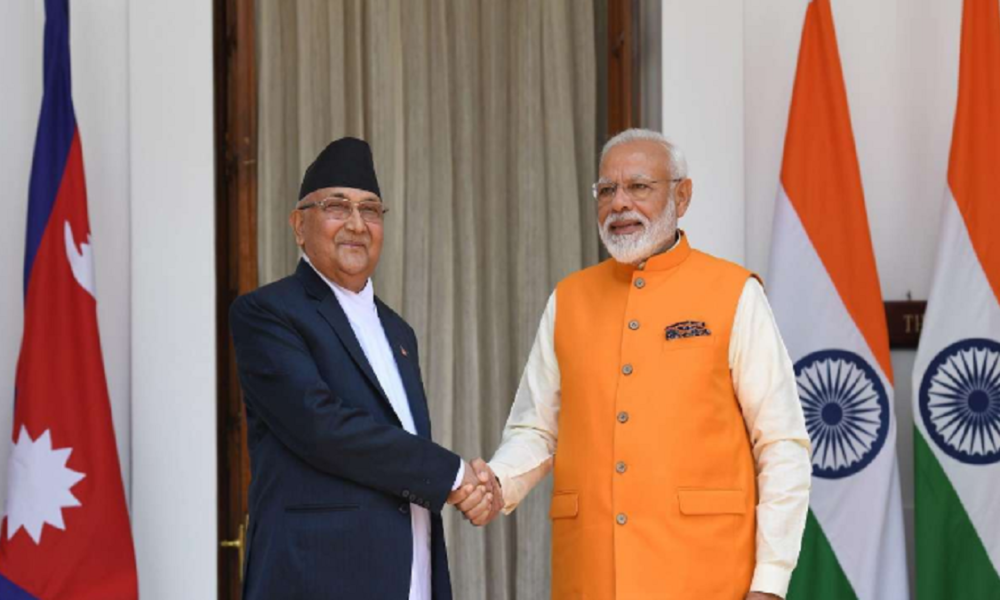The Global Times news dispatch — that if India takes on China it would have to fight a threefront war — is a gross misinterpretation of the actual situation. One could understand China counting on its all-weather friend, Pakistan. But it would be rather stupid on the part of China to equate Nepal and Pakistan in its strategic relations with India.
Nepal has recently altered its boundary map and has included areas disputed with India and has thus unnecessarily annoyed the big brother. India had already rejected Nepal’s claim to the areas of Kalapani, Lipulekh and Limpiyadhura in Uttarakhand. But Nepal went ahead and included these areas in its revised map bill passed by a thumping majority of its legislators.
Taking cue from this development Chinese media has already arrived at the conclusion that China has been able to win over Nepal. Interestingly Nepal’s civil society is still heavily inclined towards India. Thursday’s protests outside Chinese Embassy in Kathmandu stand testimony. Protestors urged China not to compare it with Pakistan and to stop dragging Nepal into a military confrontation with India.
Basically the India-Nepal row had aggravated when India opened a link road in early May via disputed Nepali territory at Lipulekh at Kailash Mansarovar in the Tibet Autonomous Region of China. Nepal had objected formally, demanding for diplomatic talks to resolve the issue. But since India was grappling with Covid-19 crisis much attention could not be paid.
The growing Chinese influence in Nepal has been a strong reason for change in Nepal’s attitude towards India. But the two countries have for centuries enjoyed strong social, religious and civilisational ties. Nepal’s trade with India is estimated to be $7.7 billion.
Unfortunately, there is a growing feeling in Nepal that elections could be won by whipping up antiIndian sentiments. The immediate provocation, however, for Nepal’s distancing itself from India could be a deep sense of insecurity among top Nepali political leadership.
Sources say there are political reasons for the volte face of Prime Minister K.P. Sharma Oli, who is believed to have walked an extra mile to cultivate friendly relations with India. It was Oli who had been instrumental to quell unrest on the new map legislation when Prachanda and Madhav Nepal tried to bring the legislation earlier.
Oli had also opposed the China-Nepal one belt one road project. The Prime Minister was instrumental in Nepal extending cooperation to India on several security matters including the arrest of around 28 terrorists wanted by India.
So why was there a change of heart? Oli was considered to be very close to India. Rumours in the Nepali corridors of power suggest that the tipping point could be a sudden merger of two political parties of Nepal — Samajwadi Party and Rashtriya Janta Party.
Apparently Oli was in talks with members of the fourth largest party Samajwadi Party (having communist bent of mind) for a possible break-up to accommodate its members into his political fold. However, the sudden merger marred his political prospects making him jittery.
It is being speculated in Nepal that India played a significant role in the merger on the behest of Oli’s political opponents. This seems quite plausible as some of the members of Samajwadi Party were hobnobbing with Pakistan and were regularly seen attending functions at the Pakistan Embassy in Kathmandu.
Before the merger Oli wanted to engage with the highest Indian political dispensation for his closer ties with the Indian government but due to India’s preoccupation with Covid-19 crisis the talks were delayed. And the task of engaging with him was possibly delegated to the Indian diplomats. This further enraged Oli, who felt insulted.
Overall perception was that political dispensations of both the countries were not willing to engage on the issue of boundary dispute. The Ministry of External Affairs says it made several efforts to engage with Nepal but in vain. Oli was interested in only engaging with top Indian political leaders.
Unfolding of these events has spurred Nepal just to prove a point. By doing so it has made itself so vulnerable that it now appears to be sitting in the Chinese lap. Its hasty and impulsive decisions have soured centuries-old friendly relations with India.
Nepal may have to pay a heavy price for this misadventure; it may even lose its autonomy, just like Tibet did under the insatiable expansionist agenda of China. Nepal should be worried that China has already started claiming Mount Everest, which is considered to be an icon of Nepal’s identity worldwide, to be its own.
Nepal’s overtures to China have now put it in the harm’s way. The ball has been set in motion. A country which was known as India’s friend is caught in the whirlpool of communism. Needless to say, communist agenda transgresses national loyalties and is capable of heavily influencing people of the country in favour of China.
Communist ideology has made strong inroads into Nepal by influencing the political class using various tactics including money power. Sources say Beijing has been regularly inviting Nepal’s political leaders to Beijing and showing them the stars. The idea behind this exercise is to align Nepali leaders with the world vision of Chinese Premier Xi Jinping.
Chinese penetration in Nepal’s political set up has even penetrated down to village level. China played a crucial role in local rural body elections. Clearly Nepal has become a hotbed of communism and on the other hand flirting with fire from Pakistani side. Nepal has given up on its Panchseela — non-alignment principles, which are said to have originated there.
The Chinese influence in the region has been particularly on the upswing since the US and the European Union intensified their proTibetan activities in Nepal. Earlier China used to silently influence Nepal but since the overwhelming Western influence it has openly started intensifying its activities.
The bone of contention between India and Nepal has been the recent passage of a constitutional amendment bill which lays out the country’s new map that includes Indian territories. President Bidhya Devi Bhandari has given her assent to the bill within hours of its passage in Rashtriya Sabha.
A few days ago Nepal’s army chief Purna Chandra Thapa and armed police force chief Shailendra Khanal had visited the disputed territory. Nepal now plans to mobilise its non-resident Nepalis for issuing memorandum against India on this issue in the UK, the US, Canada and Australia. The timing of these activities coincide with clashes with China and show a clear pattern that all this is happening on the behest of China over the period of time.
Objectively Nepal doesn’t stand to gain anything from its assertion on the issue of the new map. Revision of the map could be strategically advantageous for China. Nepal would certainly not like to go to war with India even in the worst-case scenario.
Interestingly while China’s objection to Daulat Beg Oldi road link in Ladakh became a flashpoint for a war-like situation with India, it had no objection for opening up Lipulekh road link for trade with India. Nepal has, though, lodged a protest saying it was not consulted in the process.
Recently Defence Minister Rajnath Singh said that Nepal and India have had “Roti and Beti” relations, meaning that they are interdependent both socially and economically. Madeshis living on the Nepali side have greater connections with Uttarakhand up to Dehradun rather than Kathmandu.
There have been regular passages of people from both sides in Gorakhpur, Gonda, Bahraich and Lakhimpur Kheri. There are at least 10 crossing points in Raxaul, Madhubani and Purnia. The identity of Janakpur which is linked to Ayodhya cannot be replaced by Beijing or Shanghai. Pashupati Nath temple, which has Malyali and Maharashtrian priests, houses one of the Jyotirlingas, it cannot be isolated with Kedarnath, Kashivishwanath down to Rameshwaram.
However, Nepal, it appears, has chosen to put its national sentiments and interests on the back-burner. Party ideologies and personal gains have taken precedence. It is a fact that empires built on personal ambition of rulers don’t survive long.
Several activities of Nepal are alienating it from India. For example, it intends to bring a new citizenship bill which proposes that any Indian girl when married and settled down in Nepal will get citizenship only after seven years of stay. Similarly, people in Nepal say that on the pretext of corona precautions, the country intends to regulate its borders with India. It has about 1,700 km of open border with India having multiple entry points, but it now has restricted a single-entry point in each district. This would discourage peopleto-people contact. Similarly there are talks of bringing a visa regime and treat India just like it treats other nations.
When India proposed to create a free trade zone between Bangladesh, Bhutan and Nepal, the latter was the only country which did not agree to the proposal. There is a belief in Nepal that it now intends to limit its religious activity to pilgrimage in religious places of Nepal such as Pashupatinath, Mukti Dham, Janki Mandir, Lumbani, and not extend it to Char Dham Yatra in India.
There is a view in Nepal that India must woo Oli as he is a strong leader with communist support, which could be useful in tackling the prevailing situation. There is also a view in Nepal that India over the decades has had a condescending approach with Nepal.
India must stop micro management in the Himalayan state and deal with the situation politically, rather leaving it to diplomats to assuage the situation.
It cannot take its relationship with the neighbour for granted any more. In the past India has conceded three bighas of land to Bangladesh to rationalise the borders. If Nepal respects its friendship with India, both can also sit across the table to resolve the border issues. It should not be forgotten India puts its vital security responsibility in Gorkha soldiers, representing unbreakable bonds of brotherhood between the two countries.
At the same time Nepal should not think, even for a moment, if provoked during a dispute with China, India is likely to go softer on Nepal. Nepal should not take advantage of the fact that India is in a tight situation following its clashes with China and should avoid any further escalation. It should also stop to be too demanding of its big brother.







